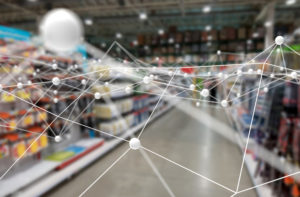By Matt Zilli, CEO, Clarizen
The COVID-19 crisis has been a shock to the system for retailers. Over the past six months, retail businesses have had to reorganise supply chains, set-up remote operations and make tough financial decisions as they deal with the ongoing impact of the pandemic.
Although supermarkets across the globe have seen an increase in demand and, in some cases, an uptick in financial results – with the online grocery market, in particular, seeing strong growth during the coronavirus crisis – most other retailers are struggling to adapt to the new normal. Overall, lockdown and other restrictions have led to a sharp decline in global retail sales, which are projected by eMarketer to fall by close to 6% in 2020 – with sales of luxury goods and apparel expected to be among the hardest hit.
As the COVID-19 crisis continues to batter the world economy, retailers are looking at how they can bounce-back and start to grow their businesses again. The retail landscape is undergoing seismic change, as stores – and indeed whole chains – close, online shopping becomes even more prevalent, and consumers remain reluctant to venture into bricks and mortar locations. Businesses must fundamentally rethink their processes and operations to maintain relevance and succeed while the pandemic continues to impact the sector heavily. Indeed, the crisis has made clear that, like businesses in other sectors, retailers need to embrace change and make sure their diverse and spread-out workforces can stay aligned in terms of their objectives and collaborate effectively to meet them.
Becoming business agile
The reality facing any business, but especially retailers, is that if they do not create a level of business agility that enables them to better adapt to the current challenges and those they may face in future, their long-term survival is at risk. Establishing business agility ensures that retailers, and indeed companies of all kinds, can manage the ongoing impact of COVID-19 and remain competitive. The disruption caused by coronavirus has exposed businesses that have not adapted adequately to the needs of the digital world. Whether they are just starting on their digital transformation path or well along it, their journey has been massively accelerated by the pandemic and its fallout.
Businesses that haven’t changed their processes in decades or have just taken the first steps on their transformative journeys are now having to ask questions they’ve never had to ask before. The simple fact is the agility needed to navigate the current level of transformation successfully requires collaboration, information sharing and visibility throughout the entire business.
Deploying technologies that promote more effective information sharing, workflows, and overall collaboration across teams and geographies is critical to enabling true business agility and making retailers more adaptable to the unprecedented challenges the vast majority now face.
Employing end-to-end work management tools and collaborative software allows retailers to have full visibility across their entire operations. Leveraging these technologies helps their teams to manage logistics, resourcing and supplier issues, as well as respond to changing consumer behaviours and expectations that are having a profound impact on their businesses. What’s more, vendors can also be part of the work management ecosystem, extending collaborative abilities. Having a technology platform that allows people throughout the extended organisation to track work progress, coordinate and automate workflow, and tie communications to tasks, priorities, budgets and deadlines is critical to effective collaboration and empowering employees to meet key business goals.
Giving people the power to make a difference
Empowering the people throughout the business through work management technologies enables them to make adjustments when and where they see a pressing need. In doing this, retailers ensure that they can embrace, not just the challenges, but the opportunities that come from changing market conditions – for instance, finding ways to extend your delivery reach or establish socially-distanced click and collect stations outside retail outlets.
We see the importance of being able to identify and adapt to new challenges with businesses throughout the retail supply chain. For example, one of our customers that produces protein pancakes was able to foresee where there was going to be a coconut flour shortage – a key ingredient in their product. With the help of cloud-based work management technology, the business was able to clock the issue and make the necessary adjustments ahead of it having an impact on their production and distribution.
There is now a need to be even more adaptable to new situations than ever. When there are disruptive factors that are out of your control, like the many unexpected situations triggered by the global pandemic and the resulting restrictions, it is essential to have flexible processes in place that enable people in your organisation to easily pick up on these as soon as possible and act in real-time to minimise disruption.
Staying strong no matter what the pandemic brings
While frontline employees in the retail sector will remain on the shop floors, in the delivery trucks and the distribution centres, many on the operational, administrative, marketing and management side of the business will find that they are forced to work remotely. Without full visibility of operations, workflows and tasks, employees who normally work in regional offices or headquarters that now have to work remotely will face challenges they never have before.
Whether in a temporary location or at home, employees need to flourish in their environment and be armed with the tools to do that. Anyone who has experienced increasingly busy workloads or unexpected disruption recognises the importance of establishing clear and achievable objectives and timelines to ensure that the right tasks are completed in the right order and delivered on time.
Retailers that have taken a slow and careful approach to digital transformation now find they have no option but to kick it into high gear. It is more critical than ever that they invest in tools to unlock a new depth of understanding of processes and operations across the business. In an era of uncertainty and growing instability, organisations need to be able to adapt quickly to both positive and negative changes – through the pandemic and beyond. The future is becoming less predictable, and retail businesses must do everything they can to prepare and succeed no matter what the future brings.









